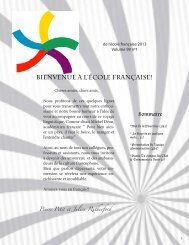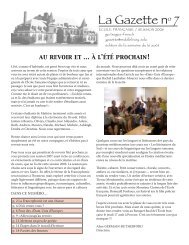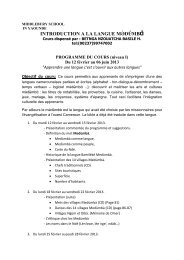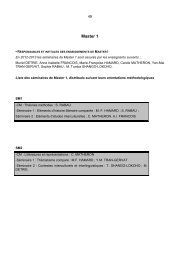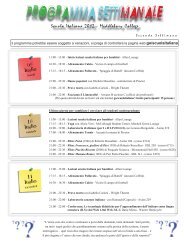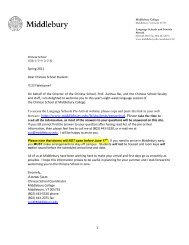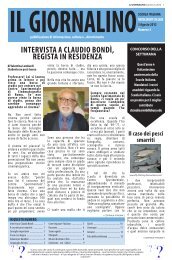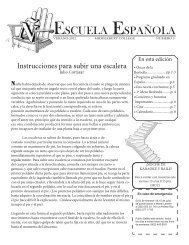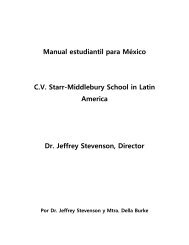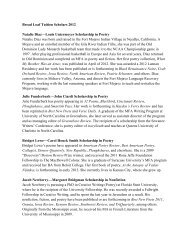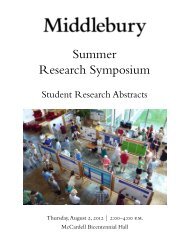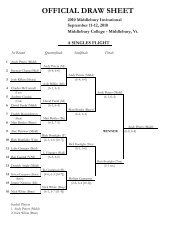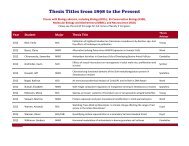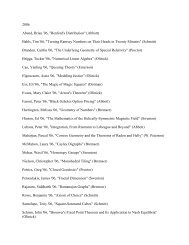2010 Catalog - Middlebury College
2010 Catalog - Middlebury College
2010 Catalog - Middlebury College
Create successful ePaper yourself
Turn your PDF publications into a flip-book with our unique Google optimized e-Paper software.
NORTH CAROLINA<br />
Bread Loaf<br />
in north carolina<br />
Group I (Writing and the Teaching of Writing)<br />
7000a Poetry Workshop/Mr. Chess/T, Th 9–11:45<br />
Imitation and departure. In our workshop, we’ll practice reading<br />
the work of other poets to pick up ideas to inform our own original<br />
poetry as well as ideas to resist or transform in our work. The main<br />
poet we’ll read closely together is Donald Justice. We’ll also read some<br />
poets whose work informs Justice (Wallace Stevens and William Carlos<br />
Williams, for instance), some poets whose work may be informed by<br />
Justice, and some poets whose work stands in sharp contrast to Justice.<br />
We’ll write two poems every week, some of which will be discussed<br />
in class. We’ll also discuss your work in individual conferences. You<br />
should leave the class with a small portfolio of original work and some<br />
new ideas about how to read the poems of others with an eye toward<br />
your own work. Kenneth Koch’s delightful Making Your Own Days will<br />
offer us insightful commentary on the process of writing and reading<br />
poetry. We’ll read Justice’s Collected Poems in its entirety. I will assign<br />
readings from The Norton Anthology of Modern and Contemporary Poetry<br />
once we’re together. Poets we’ll definitely get to in the anthology are<br />
Stevens and Williams.<br />
Texts: Kenneth Koch, Making Your Own Days: The Pleasures of Reading<br />
and Writing Poetry (Touchstone); Donald Justice, Collected Poems<br />
(Knopf); The Norton Anthology of Modern and Contemporary Poetry, vols.<br />
I and II, ed. Jahan Ramazani, Richard Ellmann, and Robert O’Clair<br />
(Norton).<br />
7030 Rewriting a Life: Teaching Revision as a Life Skill<br />
Ms. Warnock/M, W 9–11:45<br />
Through daily reading, writing, and rewriting, we will examine the<br />
usefulness of Kenneth Burke’s rhetoric for writers and teachers of writing<br />
and literature, particularly his images of life as “a rough draft” and<br />
a “’project’ in composition” and his theory of writing and reading as<br />
acts of identification. We will read the following works in the following<br />
order, except works by Murray and Stafford will be used throughout<br />
the course and should be read in advance. Students will present drafts<br />
and final copies to the class each week and prepare a final course<br />
portfolio. For the first class, read and take notes on Tim O’Brien’s<br />
In the Lake of the Woods for discussion and for your own writing.<br />
Texts: Tim O’Brien, In the Lake of the Woods (Mariner); Tony<br />
Hoagland, What Narcissism Means to Me (Graywolf); The Story behind the<br />
Story, ed. Peter Turchi and Andrea Barrett (Norton); W.G. Sebald,<br />
The Emigrants (New Directions); Ian McEwan, Atonement (Anchor);<br />
Donald M. Murray, Crafting a Life in Essay, Story, Poem (Boynton/<br />
Cook); William Stafford, You Must Revise Your Life (Michigan).<br />
7040 Writing about Place/Mr. Warnock/M, W 2–4:45<br />
“To know a place, like a friend or lover, is for it to become familiar...<br />
to know it better is for it to become strange again.” —Rebecca Solnit<br />
We may think of a place as having a certain character, an identity, a<br />
particular kind of order and stability. And yet we know that a sense of<br />
place can emerge most strongly when it is being threatened or otherwise<br />
contested. We take place as something “natural” and yet we also<br />
know that it is constructed and in history. We may think of writing<br />
about place as something that insiders are best able to do, but then<br />
again as something that outsiders—travelers, anthropologists, people<br />
from “off”—are in an even better position to do. Not surprisingly,<br />
the meanings of “place,” according to the OED, are, well, all over the<br />
place: “[T]he senses are numerous and…difficult to arrange.” In this<br />
writing class, we will enter this world of possibility through reading,<br />
field trips, music, and regular writing. The books we will read, in order,<br />
are below. Please read Welty before the first class.<br />
16<br />
Texts: Eudora Welty, One Writer’s Beginnings (Harvard); “Saving<br />
the Life That Is Your Own,” “Beyond the Peacock,” “Zora Neal<br />
Hurston,” and “Looking for Zora” in Alice Walker, In Search of Our<br />
Mothers’ Gardens (Harvest); Annie Dillard, Pilgrim at Tinker Creek<br />
(HarperPerennial); Wilma Dykeman, The French Broad (Wakestone;<br />
out of print, but available used online); James Agee, Let Us Now Praise<br />
Famous Men (Mariner); Harry Caudill, Night Comes to the Cumberlands:<br />
A Biography of a Depressed Area (Jesse Stuart Foundation).<br />
7120 Literacy, Race, and Class/Ms. Moss/M, W 9–11:45<br />
Race, ethnicity, and class are assumed to be powerful forces in group<br />
and individual literacy lives. Further, histories of literacy and literacy<br />
narratives cannot be divorced from a people’s racialized and socioeconomic<br />
identities. In this course, we will explore how literacy(ies) shape<br />
and are shaped by these racial, ethnic, and class-based identities.<br />
We will look at how race intersects with ethnicity, class, and gender<br />
among other identity markers and how one’s “marked” body contributes<br />
to an understanding of literacy practices among a variety of diverse<br />
groups. Further, we will explore how our pedagogies are shaped by<br />
our assumptions about literacy, race, and class. We will examine this<br />
topic from multiple research perspectives—historical, ethnographical,<br />
theoretical, to name a few. My major purpose is to begin a conversation<br />
about how scholars and teachers understand the complexities of<br />
race and class in literacy studies.<br />
Texts: Jacqueline Royster, Traces of a Stream: Literacy and Social Change<br />
among African American Women (Pittsburgh); Mike Rose, Lives on the<br />
Boundary (Penguin); School’s Out: Bridging out of School Literacies with<br />
Classroom Practice, ed. Glynda Hull and Katherine Schultz (Teachers<br />
<strong>College</strong>); Bob Fecho, “Is This English?” (Teachers <strong>College</strong>); Latino/a<br />
Discourses: On Language, Identity, and Literacy Education, ed. Michelle<br />
Hall Kells, Valerie Balester, Victor Villanueva (Boynton/Cook);<br />
Margaret Finders, Just Girls (Teachers <strong>College</strong>); Valerie Kinloch,<br />
Harlem on Our Minds (Teachers <strong>College</strong>).<br />
Group II (English Literature through the<br />
Seventeenth Century)<br />
7259 Shakespeare and Science: A Cultural History of<br />
Knowledge in Renaissance England/Ms. Spiller/T, Th 2–4:45<br />
The Renaissance is of course the Age of Shakespeare. It is also the Age<br />
of the Scientific Revolution (or, more accurately, of the scientific and<br />
proto-scientific evolutions) that extend from Copernicus to Brahe and<br />
Kepler, from Vesalius to Harvey, from Galileo and Bacon to Newton<br />
and Boyle. This course explores the ways in which these two great<br />
ages, the one of science and philosophy, and the other of literature and<br />
art, intersected with one another. Focusing on such works as Romeo<br />
and Juliet, Julius Caesar, The Rape of Lucrece, Hamlet, Othello, Lear, The<br />
Tempest, and The Winter’s Tale, we will explore how Shakespeare’s plays<br />
reflect and comment upon such topics as cosmography, physics and<br />
matter theory, epicureanism and atomism, Galenic humoralism, and<br />
the mechanical arts. We will introduce some of the major scientific and<br />
philosophical developments that defined the period, but our ultimate<br />
goal will be to understand how literature, and Shakespeare’s work in<br />
particular, participated in new definitions of the relationship between<br />
art, knowledge, and science.<br />
Texts: The Norton Shakespeare, 2nd ed., ed. Stephen Greenblatt et al.<br />
(Norton); excerpts from Aristotle, Galen, Hippocrates, Francis Bacon,<br />
Pico della Mirandola, and Galileo will be available at Bread Loaf.



